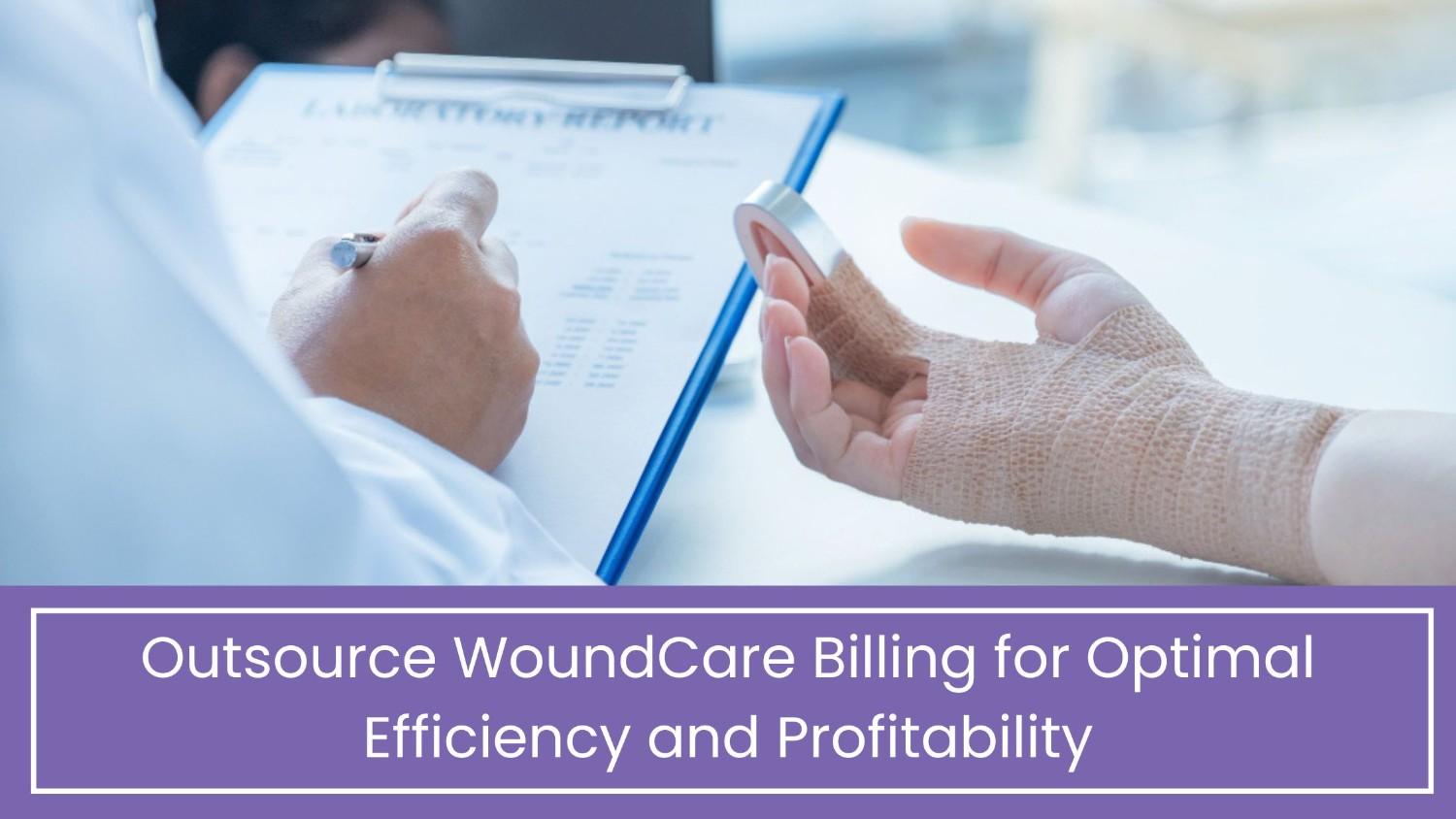Outsource WoundCare Billing for Optimal Efficiency and Profitability
Navigating the intricacies of wound care billing poses a considerable challenge for healthcare practices. Keeping pace with ever-changing healthcare regulations, coding updates, and compliance standards is imperative. While medical billing may seem intricate, this blog delves into a viable solution that is transforming how medical facilities manage their wound care billing, the outsourcing option. Outsource woundcare billing offers an efficient approach that can greatly benefit your practice. By delegating this critical task to experts in the field, healthcare providers can concentrate on their primary mission – delivering top-quality patient care.
This article explores the advantages of outsourcing your wound care billing requirements, illuminating the streamlined operations it brings to your practice. From enhanced coding accuracy to a decrease in billing errors, uncover how this strategy can elevate your practice’s financial well-being and overall effectiveness.
Table of Contents
What is the Concept of Wound Care Billing?
Wound care billing encompasses the precise documentation and submission of medical invoices for the treatment and care of wounds. This encompasses various services, including wound assessment, cleansing, dressing changes, infection control, and other relevant medical procedures. The core objective of wound care billing is to ensure healthcare providers receive equitable compensation for their services while adhering to insurance regulations and medical coding standards.
Significance of Wound Care Billing
The significance of wound care billing cannot be overstated. In the absence of proper billing, healthcare providers may struggle to maintain the necessary resources for delivering effective wound care. Furthermore, precise wound care billing contributes to the transparency of medical services. Patients have the right to comprehend the cost breakdown of their treatments, and transparent billing fosters trust between patients and healthcare providers. When patients understand the value they receive, their satisfaction increases, creating a positive healthcare experience.
Accurate wound care billing is also vital for maintaining compliance with healthcare regulations. Medical billing and coding procedures are subject to various rules and guidelines. Ensuring precise billing practices helps healthcare providers adhere to these regulations, averting potential financial and legal consequences.
Effective wound care billing is a cornerstone for delivering high-quality healthcare services. When healthcare providers receive timely and accurate reimbursement for their services, they can invest in training, technology, and resources that elevate the overall quality of wound care treatment. This, in turn, benefits patients by ensuring they receive the best possible care for their wounds.
Challenges associated with internal wound care billing and coding
Comprehending the Rules of Code Utilization is Vital. It is crucial to understand the intricacies and guidelines associated with the correct application of codes. Here are some challenges one may encounter when handling billing and coding for in-house wound care:
- Incomplete Information:
A common error involves omitting additional details such as measurements of the treated area’s size.
- Complex Debridement Reporting:
Accurately reporting non-selective and selective debridement areas can be challenging in wound care coding.
- Service Reporting Oversight:
There are instances where Evaluation and Management (E/M) services are forgotten, and wound dressing is reported separately.
- Thorough Record Review:
Managing chronic diseases necessitates a comprehensive review of patient records, including treatment procedures, follow-ups, and image documentation of wound progress, which can be overwhelming.
- Lack of Specificity:
Physicians often fail to clearly document specific wound details, which are crucial for selecting the correct diagnosis code.
Addressing these in-house wound care billing and coding challenges requires meticulous attention to detail. It involves capturing precise information about procedures, sizes, and wound particulars. A thorough review of the patient’s history is essential, even in cases of chronic conditions. Ensuring accurate coding and comprehensive documentation allows healthcare providers to effectively manage these challenges.
For effective wound care billing and coding, several key steps are essential:
– Provide a detailed description of the injury, including size, drainage, appearance, signs of infection, and any underlying medical conditions.
– Clearly specify the deeper tissue layers removed during the procedure and describe the method of removal, whether through nippers, scalpels, curettes, or scissors.
– Explain precisely how the tissues were cut.
– Include information about the wound’s healing process, such as the type of dressing required, the anticipated healing time, scheduled appointments, and follow-up visits.
– Thoroughly document the progress of healing, noting improvements in the wound.
– Provide a comprehensive overview to identify any new medical issues that might require antibiotics, biopsies, additional tests, consultation with podiatrists, or vascular procedures.
Considering Medical Billing Outsourcing for Wound Care: A Wise Decision for Your Healthcare Practice!
Outsourcing wound care medical billing has emerged as a pragmatic and effective solution for healthcare providers seeking to streamline their operations and enhance revenue cycle management. Here are several compelling reasons why healthcare practitioners find it sensible to outsource wound care billing:
- Operational Efficiency:
Outsourcing wound care billing enables healthcare providers to streamline their operations by delegating billing tasks to specialized professionals, freeing up valuable time and resources. This allows healthcare practitioners to concentrate on providing quality patient care, enhancing both patient satisfaction and staff productivity.
- Billing Expertise:
The complexity of medical billing requires a specialized skill set. Outsourcing connects healthcare providers with experts well-versed in medical billing codes, insurance regulations, and claim submission processes, reducing the risk of errors and claim denials.
- Cost-Effectiveness:
Outsourcing is often a cost-effective strategy compared to maintaining an in-house billing team, eliminating the need for recruitment, training, and benefits. Outsourced billing services typically operate on a fee-based structure, enabling practices to pay for services as needed.
- Improved Revenue Cycle Management:
Outsourcing accelerates the billing process and reduces payment delays. Experienced billing professionals oversee claims submission, follow-ups, and payment tracking, optimizing cash flow and financial planning.
- Regulatory Compliance:
Outsourced billing services ensure compliance with regulations like HIPAA, reducing legal and financial risks associated with non-compliance.
- Advanced Technology:
Outsourcing often includes the use of advanced billing software and technology, enhancing accuracy and efficiency in claims handling.
- Focus on Patient Care:
With billing tasks handled by experts, healthcare providers can refocus on patient care, building relationships, and ensuring positive outcomes.
- Scalability and Flexibility:
Outsourcing offers scalability and flexibility to adapt to changing billing needs as medical practices grow.
- Reduced Administrative Burden:
Outsourcing relieves healthcare practitioners of administrative tasks, leading to improved job satisfaction and overall well-being.
- Data Security:
Reputable outsourcing companies prioritize data security and confidentiality, safeguarding patient information through encryption and secure data storage.
By entrusting billing responsibilities to specialized professionals, healthcare practitioners can enhance efficiency, revenue management, and the overall success of their practice.
Elevate Your Wound Care Billing with Practolytics!
In short, opting for outsourced wound care billing solutions is a wise decision for healthcare providers. This strategic choice allows medical practices to streamline operations and prioritize patient care. By delegating billing tasks to specialized professionals, healthcare practitioners can free themselves from administrative burdens and focus on delivering high-quality healthcare.
The benefits are clear: Billing expertise reduces errors, efficient revenue cycle management ensures financial stability, and compliance with regulations is guaranteed. The use of advanced technology enhances accuracy, while scalability accommodates practice growth, relieving administrative stress and safeguarding data security. This shift towards outsourcing is a positive step towards a more efficient and successful healthcare practice.
Discover seamless billing solutions for wound care with Practolytics! Our unparalleled expertise in medical billing ensures your wound care facility receives the best financial management. Say goodbye to billing complexities as we streamline the entire process, guaranteeing accurate claims, faster reimbursements, and reduced denials. We stand out with our personalized approach, catering to your specific wound care billing needs. Our dedicated team understands the intricacies of wound care coding and regulations, minimizing errors and maximizing revenue. Trust us to handle your billing while you focus on patient care.
ALSO READ – Exploring the Future of Healthcare RCM: A 2023 Market Analysis
Talk to Medical Billing Expert Today — Get a Free Demo Now!






